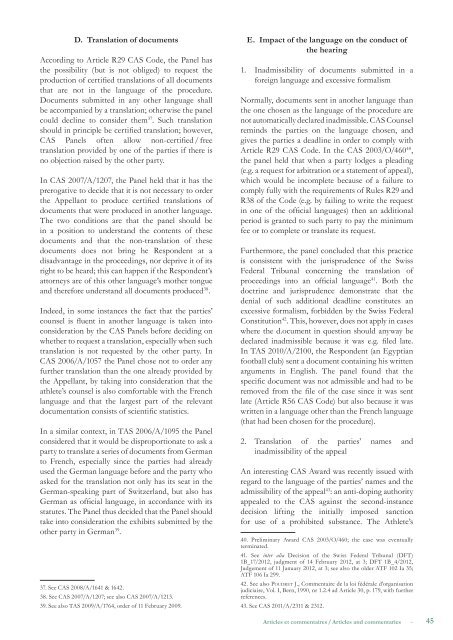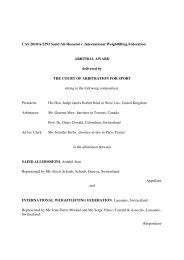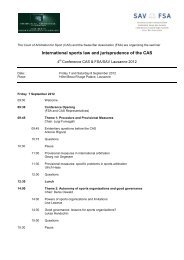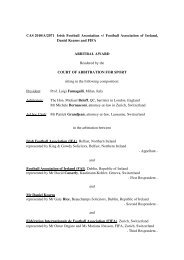(CAS) Bulletin - Tribunal Arbitral du Sport / TAS
(CAS) Bulletin - Tribunal Arbitral du Sport / TAS
(CAS) Bulletin - Tribunal Arbitral du Sport / TAS
Create successful ePaper yourself
Turn your PDF publications into a flip-book with our unique Google optimized e-Paper software.
D. Translation of documents<br />
According to Article R29 <strong>CAS</strong> Code, the Panel has<br />
the possibility (but is not obliged) to request the<br />
pro<strong>du</strong>ction of certifi ed translations of all documents<br />
that are not in the language of the proce<strong>du</strong>re.<br />
Documents submitted in any other language shall<br />
be accompanied by a translation; otherwise the panel<br />
could decline to consider them 37 . Such translation<br />
should in principle be certifi ed translation; however,<br />
<strong>CAS</strong> Panels often allow non-certifi ed / free<br />
translation provided by one of the parties if there is<br />
no objection raised by the other party.<br />
In <strong>CAS</strong> 2007/A/1207, the Panel held that it has the<br />
prerogative to decide that it is not necessary to order<br />
the Appellant to pro<strong>du</strong>ce certifi ed translations of<br />
documents that were pro<strong>du</strong>ced in another language.<br />
The two conditions are that the panel should be<br />
in a position to understand the contents of these<br />
documents and that the non-translation of these<br />
documents does not bring he Respondent at a<br />
disadvantage in the proceedings, nor deprive it of its<br />
right to be heard; this can happen if the Respondent’s<br />
attorneys are of this other language’s mother tongue<br />
and therefore understand all documents pro<strong>du</strong>ced 38 .<br />
Indeed, in some instances the fact that the parties’<br />
counsel is fl uent in another language is taken into<br />
consideration by the <strong>CAS</strong> Panels before deciding on<br />
whether to request a translation, especially when such<br />
translation is not requested by the other party. In<br />
<strong>CAS</strong> 2006/A/1057 the Panel chose not to order any<br />
further translation than the one already provided by<br />
the Appellant, by taking into consideration that the<br />
athlete’s counsel is also comfortable with the French<br />
language and that the largest part of the relevant<br />
documentation consists of scientifi c statistics.<br />
In a similar context, in <strong>TAS</strong> 2006/A/1095 the Panel<br />
considered that it would be disproportionate to ask a<br />
party to translate a series of documents from German<br />
to French, especially since the parties had already<br />
used the German language before and the party who<br />
asked for the translation not only has its seat in the<br />
German-speaking part of Switzerland, but also has<br />
German as offi cial language, in accordance with its<br />
statutes. The Panel thus decided that the Panel should<br />
take into consideration the exhibits submitted by the<br />
other party in German 39 .<br />
37. See <strong>CAS</strong> 2008/A/1641 & 1642.<br />
38. See <strong>CAS</strong> 2007/A/1207; see also <strong>CAS</strong> 2007/A/1213.<br />
39. See also <strong>TAS</strong> 2009/A/1764, order of 11 February 2009.<br />
E. Impact of the language on the con<strong>du</strong>ct of<br />
the hearing<br />
1. Inadmissibility of documents submitted in a<br />
foreign language and excessive formalism<br />
Normally, documents sent in another language than<br />
the one chosen as the language of the proce<strong>du</strong>re are<br />
not automatically declared inadmissible. <strong>CAS</strong> Counsel<br />
reminds the parties on the language chosen, and<br />
gives the parties a deadline in order to comply with<br />
Article R29 <strong>CAS</strong> Code. In the <strong>CAS</strong> 2003/O/460 40 ,<br />
the panel held that when a party lodges a pleading<br />
(e.g. a request for arbitration or a statement of appeal),<br />
which would be incomplete because of a failure to<br />
comply fully with the requirements of Rules R29 and<br />
R38 of the Code (e.g. by failing to write the request<br />
in one of the offi cial languages) then an additional<br />
period is granted to such party to pay the minimum<br />
fee or to complete or translate its request.<br />
Furthermore, the panel concluded that this practice<br />
is consistent with the jurisprudence of the Swiss<br />
Federal <strong>Tribunal</strong> concerning the translation of<br />
proceedings into an offi cial language 41 . Both the<br />
doctrine and jurisprudence demonstrate that the<br />
denial of such additional deadline constitutes an<br />
excessive formalism, forbidden by the Swiss Federal<br />
Constitution 42 . This, however, does not apply in cases<br />
where the d.ocument in question should anyway be<br />
declared inadmissible because it was e.g. fi led late.<br />
In <strong>TAS</strong> 2010/A/2100, the Respondent (an Egyptian<br />
football club) sent a document containing his written<br />
arguments in English. The panel found that the<br />
specifi c document was not admissible and had to be<br />
removed from the fi le of the case since it was sent<br />
late (Article R56 <strong>CAS</strong> Code) but also because it was<br />
written in a language other than the French language<br />
(that had been chosen for the proce<strong>du</strong>re).<br />
2. Translation of the parties’ names and<br />
inadmissibility of the appeal<br />
An interesting <strong>CAS</strong> Award was recently issued with<br />
regard to the language of the parties’ names and the<br />
admissibility of the appeal 43 : an anti-doping authority<br />
appealed to the <strong>CAS</strong> against the second-instance<br />
decision lifting the initially imposed sanction<br />
for use of a prohibited substance. The Athlete’s<br />
40. Preliminary Award <strong>CAS</strong> 2003/O/460; the case was eventually<br />
terminated.<br />
41. See inter alia Decision of the Swiss Federal <strong>Tribunal</strong> (DFT)<br />
1B_17/2012, judgment of 14 February 2012, at 3; DFT 1B_4/2012,<br />
Judgement of 11 January 2012, at 3; see also the older ATF 102 Ia 35;<br />
ATF 106 Ia 299.<br />
42. See also POUDRET J., Commentaire de la loi fédérale d’organisation<br />
judiciaire, Vol. I, Bern, 1990, nr 1.2.4 ad Article 30, p. 179, with further<br />
references.<br />
43. See <strong>CAS</strong> 2011/A/2311 & 2312.<br />
Articles et commentaires / Articles and commentaries<br />
-<br />
45





